|
|
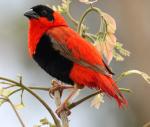
|
Orange Bishop
|
Overview
Orange Bishop: Small weaver finch with bright orange-red body and black belly. The head has a black crown, face, and bill and the wings are brown. Orange-red uppertail coverts are very long and extend over the short, brown tail. Native to sub-Saharan Africa. AKA Orange Weaver Finch. |
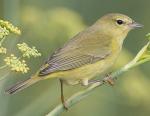
|
Orange-crowned Warbler
|
Overview
Orange-crowned Warbler: Small warbler with olive-green upperparts and faintly streaked, yellow underparts. The head has inconspicuous orange crown, broken eye-ring, and faint eye-line. Though it lives and nests in dense foliage close to the ground, the male perches at the tops of tall trees to sing. |
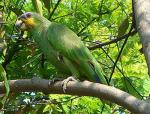
|
Orange-winged Parrot
|
Overview
Orange-winged Parrot: Medium green parrot, yellow head, broad blue eyebrow. Small red-orange patch in secondary feathers while perched and in flight. When fanned out the tail shows pretty blue, orange, yellow, and green highlights. Hooked bill is dull yellow with a dark tip. Legs and feet are gray. |
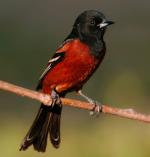
|
Orchard Oriole
|
Overview
Orchard Oriole: Small oriole, black head, back, tail, and chestnut-orange shoulder patches, underparts, rump. Wings are black with single broad white bar; flight feathers have white edges. Feeds on insects, fruits, berries, nectar and flowers. Swift direct flight on rapid wing beats. |
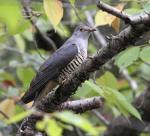
|
Oriental Cuckoo
|
Overview
Oriental Cuckoo: Medium-sized cuckoo with gray upperparts, gray throat, and distinctly barred breast. Wings and long tail are dark gray. Bill is decurved and yellow with dark tip. Feeds on caterpillars, insects and their larvae. Flies low to the ground, holds wings low during flight. |
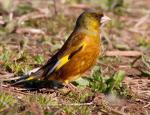
|
Oriental Greenfinch
|
Overview
Oriental Greenfinch: Medium finch with dark gray-brown upperparts, brown underparts, yellow undertail coverts. Face, breast, rump are olive-green; cap, nape are gray. Bill is pink. Dark wings have white-edged feathers and large yellow patches. Black tail has yellow on outer feathers. |
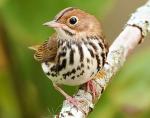
|
Ovenbird
|
Overview
Ovenbird: Medium, ground walking warbler, olive-brown upperparts, heavily spotted white underparts. Head has dull orange central crown stripe edged in black, and a white eye-ring. Wings, tail are olive-green. Name is from its covered nest, the dome and side entrance make it resemble a dutch oven. |
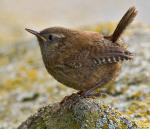
|
Pacific Wren
|
Overview
Pacific Wren: Formally grouped with the Winter Wren, this bird is now considered its own species. A very small wren with barred, dark brown upperparts and buff eyebrows. May appear rufous brown. Brown underparts are lightly barred on flanks, belly, and undertail. Tail is very short and held upright. Sexes are similar. |
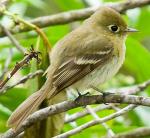
|
Pacific-slope Flycatcher
|
Overview
Pacific-slope Flycatcher: Small flycatcher, olive-brown upperparts, yellow throat and belly, olive-gray breast. Eye-ring is white and elongated. Wings are dark with two pale bars. Bill is long with dark upper mandible and bright yellow lower mandible. Weak fluttering flight on shallow wing beats. |
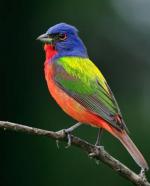
|
Painted Bunting
|
Overview
Painted Bunting: Colorful, medium-sized bunting. The male (shown in background) has a bronze-green back, bright red eyering, rump and underparts. Head and nape are blue. Wings are dark with green shoulder patches. The female (shown in foreground) has green upperparts, yellow-green underparts and dark wings. The juvenile resembles female, but is duller. Feeds on seeds, insects and caterpillars. Short, low flight; alternates rapid wing beats with wings pulled to sides. |
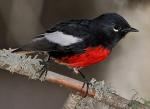
|
Painted Redstart
|
Overview
Painted Redstart: Medium warbler with black head, upperparts, bright red breast and belly. Wings are black with large, white patches. White arc beneath eye. Tail is black with thick, white edges. It only eats insects, and forages for them on the ground and in trees. It also catches them in flight. |
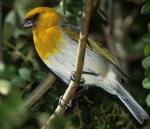
|
Palila
|
Overview
Palila: Large finch-billed honeycreeper, endemic to Hawaii. Yellow head with black lores, seperated from gray back by distinct line. Breast is yellow, belly is white and back is gray. Wings and tail are olive-green. Bill, legs, and feet are black. Strong, bouncy flight with steady wingbeats. |
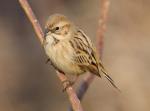
|
Pallas's Bunting
|
Overview
Pallas's Bunting: Medium bunting, gray-brown upperparts with black streaks. Lower breast, belly, and undertail coverts are white. Head, throat and upper breast are black. Collar and moustache stripe are white. Tail is black with white outer feathers and corners. Black bill, legs, feet. |
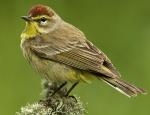
|
Palm Warbler
|
Overview
Palm Warbler: Medium warbler with olive-brown upperparts and yellow underparts streaked with brown. Cap is chestnut-brown. Western form is grayer overall and has white belly. It pumps its tail up and down more than any other warbler. Despite its name, it lives further north then most other warblers. |
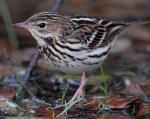
|
Pechora Pipit
|
Overview
Pechora Pipit: Small, shy pipit with heavily streaked, dark brown upperparts. The breast, sides, and flanks are washed yellow with heavy black streaks. Belly and outer tail feathers are white. It is named after the Pechora River Valley in northeastern Russia, where it breeds and nests. |
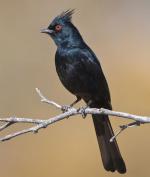
|
Phainopepla
|
Overview
Phainopepla: Small, flycatcher-like bird with glossy black body. Head has distinct crest and short, thin, black bill. Wings have large white patches visible in flight. Tail is long. Iris is red. Legs and feet are black. Feeds primarily on mistlestoe berries and small insects. Direct flight is high and fluttery. |
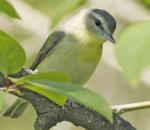
|
Philadelphia Vireo
|
Overview
Philadelphia Vireo: Medium vireo with olive-green upperparts and yellow-washed to yellow underparts. The head has a gray cap, dark eyes, and white-bordered black eye-line. Wings are olive-green with very faint wing-bars. Undertail coverts yellow. First discovered near Philadelphia in 1842. |
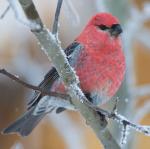
|
Pine Grosbeak
|
Overview
Pine Grosbeak: Large, robust finch with red-washed black back, gray sides and undertail coverts, and pink-red rump and underparts. Head and face are pink-red; bill is heavy and black. Wings are black with two pale bars. Tail is black and slightly notched. Feeds on seeds, buds, fruits and insects. |
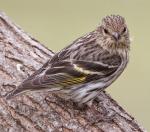
|
Pine Siskin
|
Overview
Pine Siskin: Small finch with brown-streaked body. Wings have small patches of yellow and two white wing-bars. Tail is dark, notched, and has small yellow patches. Bill is slender and pointed. Forages on ground and in trees for seeds and insects. Flight is swift and high, travels in compact flocks. |
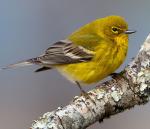
|
Pine Warbler
|
Overview
Pine Warbler: Medium warbler with plain olive-gray upperparts, yellow throat and breast, blurry-streaked sides, and white belly and undertail coverts. Wings are gray with two white bars. It is the only warbler that eats large quantities of seeds, usually pine. One of the earliest breeding warblers. |
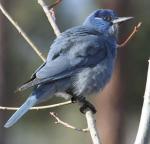
|
Pinyon Jay
|
Overview
Pinyon Jay: Small, crestless, stocky jay with blue-gray body. Head is darker blue and has pale streaks on throat. Tail is short. Bill, legs, feet are black. Feeds on pine seeds, grain, fruit, berries, insects and eggs and young of other birds. Steady bouyant and direct flight with deep wing beats. |
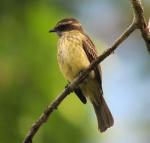
|
Piratic Flycatcher
|
Overview
Piratic Flycatcher: Small olive-brown flycatcher has brown crown, white face with dark eye-line and moustache stripe, white throat shading to pale yellow on belly, and faint dark streaks on breast, sides. Dark wings have two bars; pale feather edges. Dark tail has pale feather edges. |
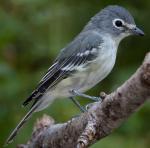
|
Plumbeous Vireo
|
Overview
Plumbeous Vireo: Medium vireo, gray back, white throat and underparts, olive-gray sides, yellow-washed flanks. Crown, nape, and face are gray; eye-rings appear as large, white spectacles. Wings are dark gray with two white bars. Tail is short with white edges. Blue-gray legs and feet. |
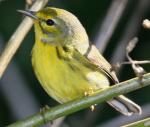
|
Prairie Warbler
|
Overview
Prairie Warbler: Small warbler, brown-streaked, olive-green upperparts with reddish-brown streaking, bright yellow underparts with black streaks on sides. Head has a yellow-green cap, yellow face, and dark eye, cheek stripes. Found in pine stands, mangroves and overgrown fields rather than prairies. |
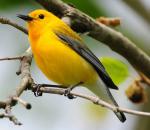
|
Prothonotary Warbler
|
Overview
Prothonotary Warbler: Medium-sized warbler with olive-green back and blue-gray wings and tail. Head, neck, and underparts are vibrant yellow and the undertail coverts are white. Bill, legs and feet are black. The only eastern warbler that nests in tree hollows. Once called the Golden Swamp Warbler. |
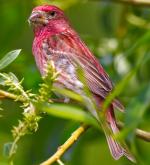
|
Purple Finch
|
Overview
Purple Finch: Medium finch, rose-red body, brown streaks on nape, back. Sides, flanks, belly are dull white with red wash; sides show thick, faint streaks. Brown wings, notched tail. Eats seeds, fruits, insects and caterpillars. Swift flight, alternates rapid wing beats with wings pulled to sides. |
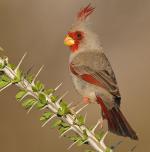
|
Pyrrhuloxia
|
Overview
Pyrrhuloxia: Large cardinal-like finch with conspicuous red-tipped gray crest, gray head, back, upperparts, red-washed face, breast, and pale gray underparts. Dark gray wings with red edges on primaries. Tail is red. Thick yellow bill. Eats insects, larvae, seeds, fruits and berries. |
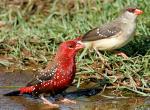
|
Red Avadavat
|
Overview
Red Avadavat: Small active finch, native to South Asia. Bright red overall with small white spots, wings are brown, and tail is black with red uppertail coverts. Lores are black, white crescent below each eye. Red bill, pink legs and feet. Undulating flight, alternates flapping and gliding. |
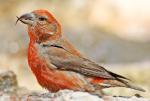
|
Red Crossbill
|
Overview
Red Crossbill: Medium finch with red-orange body, brighter red rump, and dark brown wings. Bill is dark and crossed at tip. The tail is notched. Legs and feet are gray-black. Eats seeds, insects and caterpillars. Swift bounding flight, alternates rapid wing beats with wings pulled briefly to sides. |
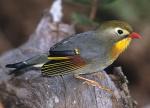
|
Red-billed Leiothrix
|
Overview
Red-billed Leiothrix: Native to southeast Asia. Crown, nape, and back are olive-green, lores, eyering, and supraloral stripe are cream to dull yellow. Bright yellow-orange throat, chin is yellow. Underparts are pale yellow. Olive-brown wings have a yellow-orange patch. Red bill, pink legs and feet. |
|
|